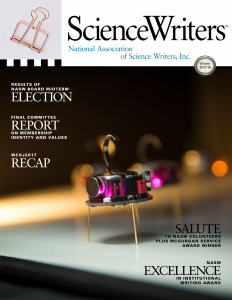In addition to connecting reporters and editors with credible scientists who can quickly and accurately provide evidence-based information of relevance to news stories, SciLine will produce accessible summaries on a variety of newsworthy, science-relevant topics and gather on-the-record comments from experts for use by reporters as they prepare their stories.
Freely available to all journalists, SciLine is designed to be particularly useful to reporters in small and medium media markets who are writing or producing stories about health, medicine or science and may not have deep science backgrounds or immediate access to credible experts.
SciLine is based at AAAS headquarters in Washington, D.C. Founding support is provided by the Quadrivium Foundation, with additional funding from the John S. and James L. Knight Foundation, the Rita Allen Foundation, and the Heinz Endowments.
"SciLine's ultimate mission is not only to shine a light on the best scientific evidence but also to help inform journalists and the public about how reliable evidence is obtained and verified," said Rick Weiss, SciLine director. "In doing so, the hope is that evidence will be seen not just as another voice in the endless 'he said, she said' of assertive discourse, but rather as a documented body of derived knowledge worthy of serious consideration as society addresses looming challenges in areas such as health and medicine, the environment, and national security."
Weiss brings more than three decades of experience in journalism and public affairs to SciLine, including 15 years as a science reporter at the Washington Post and more than 10 years leading strategic communications and media relations around issues of science and technology in the public, private, and nonprofit sectors.
"As newsrooms confront dwindling resources and an increasingly competitive information environment, the breadth and depth of science coverage has declined. At the same time, decision making on public issues increasingly relies on understanding science and technology issues," said Jennifer Preston, Knight Foundation vice president for journalism. "By connecting journalists with accurate, verified information from experts, SciLine will help to advance quality reporting on these topics, while helping to build trust between news outlets and audiences."
SciLine's media activities and operations are guided by an advisory board composed of 14 members, including reporters and editors working in large and small markets on print, broadcast and digital platforms; communications professionals and academic scholars; and scientists committed to communication with reporters and the public. Founding advisory board members are:
- Nsikan Akpan, science producer, PBS NewsHour
- Alan Alda, actor, writer and visiting professor of journalism, Stony Brook University
- Nancy Baron, director of science outreach, COMPASS
- Tracy Day, co-founder and chief executive officer, World Science Festival
- Maggie Fox, senior health writer, NBC News
- S. James Gates Jr., Brown University, and member, AAAS Board of Directors;
- Margaret Hamburg, foreign secretary, National Academy of Medicine, and president-elect, AAAS
- Laura Helmuth, health, science, and environment editor, Washington Post
- Bill Manny, community engagement editor, Idaho Statesman
- Kathryn Murdoch, co-founder and president, Quadrivium Foundation
- Geneva Overholser, independent journalist, and senior fellow, Democracy Fund
- Dietram Scheufele, professor of science communication, University of Wisconsin-Madison
- Mark Schleifstein, environment reporter, New Orleans Times-Picayune
- Talia Stroud, associate professor of communication studies and journalism, University of Texas at Austin
SciLine is editorially independent of AAAS and its philanthropic funders. Scientists and journalists interested in learning more about this new service are encouraged to visit sciline.org.
(Source: AAAS news release)
(NASW members can read the rest of the Winter 2017-18 ScienceWriters by logging into the members area.) Free sample issue. How to join NASW.




